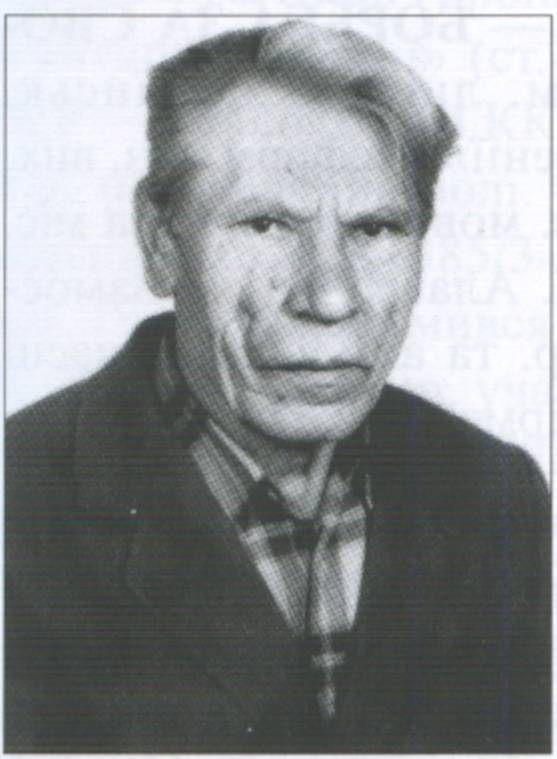Mykola Petrovych ADAMENKO (born December 20, 1931, in the village of Zahrebellia, Sosnytsia Raion, Chernihiv Oblast) is a philologist and poet. He was a participant in the Ukrainian human rights movement and a political prisoner in Soviet prisons and camps (1953–56). He became a member of the Writers’ Union of Ukraine in 1988 and is a laureate of the regional B. Hrinchenko and M. Kotsiubynsky Prizes. He was awarded the Order for Courage in 2005.

Adamenko’s father was the chairman of a collective farm and, before the war, headed the village council. He was shot by German occupiers in 1942. His mother, Nataliia Mykhailivna, worked hard on the collective farm but could not provide for her son, Mykola, and his younger sister, Lida.
Mykola began writing poetry in his school years. Some of his poems were published in the district newspaper. In 1950, he graduated from high school in the town of Sosnytsia, Chernihiv Oblast, and entered the Faculty of Philology at Kyiv University (the mandate commission barred him from the journalism faculty because he “had been in occupied territory”). He studied in the Romano-Germanic department for a year before transferring to the Ukrainian department. To better understand “Soviet reality,” he sought answers in forbidden literature, particularly the works of M. Hrushevsky, V. Vynnychenko, S. Yefremov, and others. He attended a literary studio and discussed “sensitive” topics with H. Voloshchuk and R. Dotsenko. Their conversations were wiretapped and recorded, as was later revealed during the investigation. Adamenko continued to write poems that grew increasingly rebellious, sharing them with friends he considered trustworthy. Some of them informed on Adamenko, reporting that he was dissatisfied with the collective farm system, was critical of the “scribblings” of Tychyna and Yanovsky, and was skeptical of the party’s nationalities policy. On November 22, 1952, during a “prophylactic chat” at the Ministry of State Security, Adamenko clearly articulated his Ukrainian position in a written statement, which sealed his fate.
At the time, state authorities were preparing a show trial of a non-existent underground nationalist student organization. On December 29, 1952, Adamenko’s classmate, H. Voloshchuk, was arrested. On January 14, 1953, MGB Lieutenant Colonel Shyshkin issued an order for Adamenko’s arrest and a search of his home. He was arrested on January 18, 1953, in his home village of Zahrebellia. A book titled “The Ukrainian Muse,” “nationalist” poems, notes, and letters were confiscated. Adamenko underwent 24 interrogations during the investigation.
On February 14, R. Dotsenko was arrested. On April 11, 1953, the case of the “student trio” was transferred to the Kyiv Regional Court. On May 14, in a closed session, a court presided over by Judge Hrabovska with prosecutor Utina participating, sentenced Adamenko to 10 years in the camps and 3 years of restricted rights under Articles 54-10, part 2, and 54-11 of the Criminal Code of the Ukrainian SSR. Voloshchuk received the same sentence, while Dotsenko received 8 years.
Adamenko served his sentence in the Nyroblag concentration camp (Northern Urals), working in logging.
He was released in June 1956 based on a decree by the Commission of the Presidium of the Supreme Soviet of the USSR due to the absence of corpus delicti in his actions, but he was not rehabilitated. For a time, he was unable to resume his studies. He was unemployed for a long period. He worked as a loader at the Velyka Doch station in Borzna Raion, then in his home village as a handyman, an accountant, and a leader of a fruit and vegetable brigade on a collective farm. He enrolled in the correspondence department of the Borzna Technical School of Fruit and Vegetable Growing. In 1962, he was rehabilitated and was able to re-enroll in Kyiv University as a fourth-year correspondence student in the Ukrainian department of the Faculty of Philology. He worked as a teacher of Ukrainian language, literature, and music at the Polyushkyne 8-year school in Novhorod-Siverskyi Raion. Eight years later, he moved to the town of Sosnytsia, where he taught at the Dovzhenko High School until his retirement.
His works have been published in journals, collections, and as separate editions. The poet’s works are courageous, sincere, and filled with concern for the future of Ukraine. His first poetry collection, “The Flood,” was not published until 1985. Several more books followed. Among them, in 2001, was a book of prose (a novel and 13 short stories), and in 2003, the continuation of the novel, “The Law Is Taiga.” The first and second books became books of the year in the Chernihiv region. For these works, the author was awarded the regional B. Hrinchenko Prize and later the regional M. Kotsiubynsky Prize. In 2001, he began working on the book “A History of Sosnytsia and Its Environs,” involving several other local historians in the project.
Bibliography
1.
*The Flood* (1985).
*Blossom on the Frost* (1990).
*Striving for Heaven*. Chernihiv: Prosvita, 1995, 104 pp.
“On a Shaky Footbridge Over an Abyss (A Memoir-Reflection on Hryhoriy Voloshchuk).” *Zona Almanac*, no. 20, November 2000, pp. 110-134.
*The Law Is Taiga: A Novel. Short Stories*. Chernihiv: Chernihivski Oberehy, 2001. Part 1, 211 pp.; 2003, Parts 2, 3, 238 pp.; 2009, Part 4.
*The Sosnytsia Region in the Heart of Ukraine: Local History Studies*. Compiled by M. Adamenko. Kharkiv: Prapor, 2005, 262 pp.
*In the Center of the Circle: Poems*. Chernihiv: Chernihivski Oberehy, 2006, 144 pp.
*Selected Works: Poems. Fables*. Kyiv: Vyd. dim “Kyievo-Mohylianska akademiia,” 2008, 224 pp.
*Sign of the Era: An Autobiographical Poem*. Sosnytsia, 2009, 26 pp.
*By the Laws of the Taiga: A Memoir-Novella*. Sosnytsia, 2010, 28 pp.
2.
*Resistance Movement in Ukraine: 1960–1990. An Encyclopedic Guide*. Foreword by Osyp Zinkevych, Oles Obertas. Kyiv: Smoloskyp, 2010, p. 44.
*Resistance Movement in Ukraine: 1960–1990. An Encyclopedic Guide*. Chief Editor Osyp Zinkevych. 2nd, supplemented ed. Kyiv: Smoloskyp, 2012, pp. 47-48.